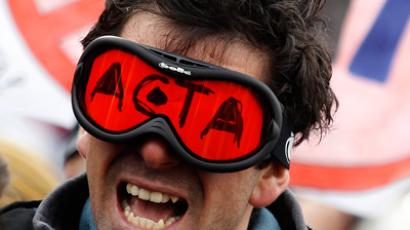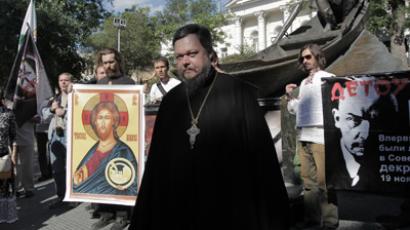Russian rights activists oppose ‘foreign agents’ label
If Russia passes a new law regulating the practice of non-government organizations receiving foreign grants, the Moscow Helsinki Group will refuse to be registered as "a foreign agent," the head of the Group told Interfax on Monday.
"They may close us down if they want,” Lyudmila Alexeyeva said. The Moscow Helsinki head said she would consult lawyers in order to avoid the requirements of the law if it is passed."As a founder and chairman of the Moscow Helsinki Group, I declare that the Moscow Helsinki Group will not get registered as a foreign agent under any circumstances," she said. Foreign donors, including the European Commission, USAID and the MacArthur Foundation, are among those groups that contribute to the Moscow Helsinki Group.According to United Russia State Duma deputy Aleksander Sidyakin, one of the amendment's initiators, the suggested changes would require that all NGOs registered within Russia but receiving money or property from foreign sources – state and private alike – be considered “foreign agents” once they get involved in political activities.Amendments to the NGO law concerning the "foreign agent" status will be considered by the State Duma in a first reading at the end of this week, Speaker Sergei Naryshkin told reporters.Earlier, the leader of the For Human Rights watchdog, Lev Ponomarev, wrote in his blog that he was not going to allow the “derogatory brand of a foreign nation’s agent” to be assigned to his group and that he hoped for support from other Russian NGOs.Meanwhile, the head of the Presidential Human Rights Council, Mikhail Fedotov has also expressed his opposition to the suggested amendments saying that if they are signed into law even the Russian Orthodox Church would fall into the category of a "foreign agent." Fedotov went to question the relevance of "financial transparency" if the NGO in question was engaging in legal activities."If this is financial transparency, what is the difference between foreign funds and internal ones," Fedotov mused. "If the organization is engaged in legal activities what is the difference if it is financed by Soros’s fund or Potanin’s fund?""And if we are talking about illegal activities, if such organization teaches suicide bombings, I have a question – what is the difference if it is financed by foreign terrorist structures or domestic ones?” he added.The head of the State Duma Security Committee, Irina Yarovaya replied to Fedotov's concerns, saying in a media interview that the church is not a non-government organization and thus the amendments cannot be applied to it. She also added that much stricter rules apply for NGOs that work in the United States.The State Duma may be taking its cue on regulating NGOs operating in the Russian Federation from the United States. In 2010, the Federal Bureau of Investigation (FBI) arrested a group of Russians for operating as agents “of a foreign government without notifying the US Attorney General.”Alexeyeva rejected the claim that her NGO works on behalf of “agents of foreign states.” “We protect our citizens when their rights are breached,” she continued. “We do not work for foreign states.”Alexeyeva said she made a similar statement to Chairman of the Presidential Council for Human Rights Mikhail Fedotov.Robert Bridge, RT














